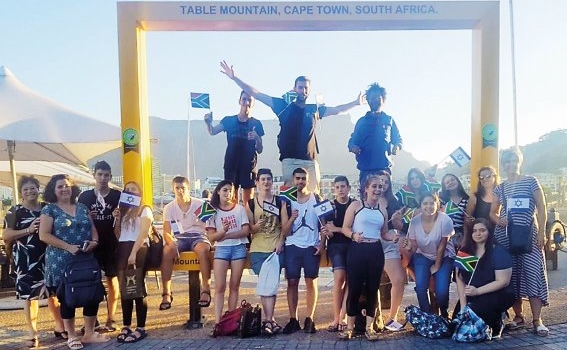
SA

Gaza border may be scary, but it’s home, visiting Israeli teens say
TALI FEINBERG
Shortly after they arrived in Cape Town, they were whisked off to a braai at the home of Tamar Lazarus, where they were indulged with breathtaking views of the city and harbour while chatting about their adventures in South Africa. They felt a million miles away, literally and figuratively, from the threat of rocket fire to their homes, schools, and environment.
The teens hail from kibbutzim in ‘the Gaza envelope’.“The kibbutz I was born on is on the fence between Gaza and Israel, and we are always exposed to burning tyres, shouting, and windows breaking from the rockets,” says Belkin. “Before the tunnels were discovered, [Israelis have discovered numerous Hamas-built tunnels underground to get into and attack Israel], friends on the kibbutz heard people knocking and talking under their floor.” Being so close to these threats forced her family to leave that kibbutz, but the place they relocated to is still under threat of attacks.
Gil Rahaf, from a different kibbutz, says that a man from Gaza was once found wondering around inside his kibbutz, and that kibbutz livestock have been killed by rockets, one of which landed 10 metres away from his house. “Sometimes we hear the ‘boom’ before we even hear the siren,” said his friend, Regev Shoshan. “On a bad day, we run to the shelter 16 times a day,” says Goldman.
Their madricha, Sapir Efraim, who came with the teens from Israel, emphasises that the area Goldman is talking about is not a constant war zone. In fact, it’s incredibly beautiful and peaceful. “My husband grew up there, and we moved back to the kibbutz six years ago as we want to raise our children in a close-knit community,” she says.
However, she explains that calm can quickly descend into chaos, and then back to calm again. “A few weeks ago, we had 400 rockets in a day, then the next day was quiet again. We are used to it, but the stress does build up in our minds.” For example, an incendiary balloon sent from Gaza landed in her garden, but it did not catch alight, unlike the acres of kibbutz fields that have been burned by these devices.
All the teens emphasise that they are used to being under constant threat of rocket attacks, and some shrug their shoulders, saying, “It’s no big deal. We are used to it. We’ve learned to handle it.” But later, one admits that even in South Africa, a sudden noise at night will scare her.
The teens are excited to be in South Africa, but some of them feel nervous about speaking Hebrew or displaying their Jewishness for fear of anti-Semitism. They are also anxious about being put on the spot by their South African Jewish peers, who they feel will force them to “take a side” in the conflict or ask them why they choose to live so close to the border. They re-iterate that they could never leave their communities.
“There are two sides to every story. We want peace. Hamas could turn Gaza into a thriving place, but it doesn’t want to. Whatever we give them, they use to attack us,” says Goldman.
Rahaf says that he feels safe in spite of the attacks, knowing that the country has some of the best defence systems in the world. But Efraim feels frustrated that this untenable situation has still not been resolved.
Even while living in a conflict zone, all the teens are proudly Israeli, deeply connected to the land, and upbeat about their future. “We still feel safer there than we do in a different country,” says Belkin. “It’s home.”
“We are excited to build a deeper connection with the South African Jewish community,” says Efraim. “Young people have the power to talk to each other, and strengthen that bond.”
“This initiative stemmed from a deep sense of our shared fate in the light of the continuing and intolerable reality in which these boys and girls grow up. They live in the shadow of unacceptable terrorist attacks,” says Habonim Dror Shaliach Danny Adeno Abebe. “Habonim Dror joined the project, and decided to make a supreme effort to realise this Zionist idea out of a deep understanding that we are brothers.”
The initiative is all about bonding and showing the resilience of youth. One person who epitomised this resilience was the late Gideon Prodgers, and this tour is in his memory. Prodgers was a South African Habonim madrich who passed away ten years ago in Israel during his gap-year programme after an eight-month battle with leukemia. The project to bring the Israelis to machaneh in Hermanus is called “From Light to Light” in Gideon’s honour.
He would have been 31 years old on the day of the gathering – 11 December – so Gideon’s parents, Rod and Laura, and sister Kayda, joined the teens on their late son and brother’s birthday. Said Kayda, “Seeing Israeli youth in Cape Town would have made him very happy!”




